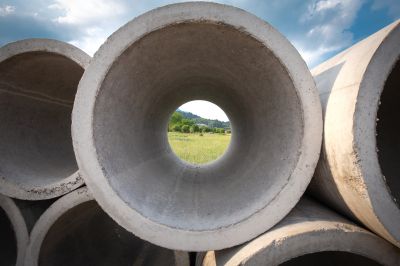Top-Rated Products for Efficient Driveway Culvert Maintenance
Choose from high-quality products designed to facilitate smooth installation, repair, and ongoing driveway drainage management.
 Maintaining a functional driveway culvert is essential for ensuring proper water drainage and preventing erosion or flooding during heavy rains. A variety of products are available to support culvert service, including pipes, fittings, and accessories designed to enhance durability and ease of installation. When selecting products for driveway culvert service, it's important to consider factors such as material quality, size compatibility, and installation requirements to ensure long-term performance.
Maintaining a functional driveway culvert is essential for ensuring proper water drainage and preventing erosion or flooding during heavy rains. A variety of products are available to support culvert service, including pipes, fittings, and accessories designed to enhance durability and ease of installation. When selecting products for driveway culvert service, it's important to consider factors such as material quality, size compatibility, and installation requirements to ensure long-term performance.
Top Overall Option
High-Density Polyethylene (HDPE) Culvert Pipe
HDPE culvert pipes are widely used for driveway drainage due to their lightweight nature, corrosion resistance, and ease of installation. They are available in various diameters to accommodate different flow capacities and are suitable for both residential and light commercial applications. Their flexibility allows for easier handling and adjustments during installation, making them a versatile choice for culvert service.
Types of Products For Driveway Culvert Service
Corrugated Metal Culvert Pipes
Durable and strong, suitable for heavy-duty applications and areas with high load demands.
Reinforced Concrete Culverts
Heavy-duty concrete pipes designed for long-lasting performance in demanding environments.
High-Density Polyethylene (HDPE) Pipes
Lightweight, corrosion-resistant pipes ideal for residential driveway drainage.
PVC Culvert Pipes
Plastic pipes offering corrosion resistance and ease of installation for smaller drainage projects.
Flexible Corrugated Pipes
Adaptable pipes that can bend around obstacles, suitable for uneven terrain.
Drainage Fittings and Couplings
Connectors and fittings to join culvert pipes securely and ensure proper alignment.
End Caps and Flanges
Components used to seal culvert ends and provide structural stability.
Filter Fabrics and Grates
Protective barriers that prevent debris entry and support water flow.
Bedding Materials
Crushed stone or gravel used to stabilize culvert pipes during installation.
Inspection and Cleaning Tools
Tools designed for maintaining and inspecting culvert systems over time.
Repair Kits
Materials for fixing minor damages or leaks in culvert pipes and fittings.
Support Brackets and Saddles
Hardware to secure culvert pipes in place and prevent shifting.
Water Flow Control Devices
Valves and flow regulators to manage water discharge effectively.
Erosion Control Products
Materials like silt fences or riprap to prevent erosion around culverts.
Traffic Safety Barriers
Barriers or warning signs to ensure safety during installation or maintenance.
Popular Choices
Commonly used for their strength and durability in various applications.
Favored for their lightweight and corrosion-resistant properties.
Popular for smaller drainage projects due to ease of installation.
Chosen for long-term performance and heavy load capacity.
Valued for their ability to bend and adapt to uneven terrain.
Essential for connecting and securing culvert sections reliably.
Help prevent debris buildup and support water flow efficiency.
Used to stabilize pipes during installation for better performance.
Important for routine maintenance and system longevity.
Help protect surrounding areas from runoff and erosion.
Help keep culvert pipes securely in place during and after installation.
Assist in managing water discharge from culvert systems.
Useful for addressing minor damages and extending system lifespan.
Culvert pipes are typically made from materials like corrugated metal, high-density polyethylene (HDPE), or reinforced concrete. Each material offers distinct advantages; for example, HDPE pipes are lightweight and resistant to corrosion, making them suitable for many residential applications. Properly chosen fittings and accessories, such as couplings, end caps, and filter fabrics, help secure the culvert system and prevent debris from clogging the pipe, ensuring efficient water flow.
Installation accessories like pipe connectors, bedding materials, and protective grates also play a crucial role in the overall effectiveness of a driveway culvert system. Selecting products that match the size and flow capacity requirements of your driveway can help avoid issues like blockages or structural failure. Regular inspection and maintenance products, including cleaning tools and repair kits, are valuable for extending the lifespan of the culvert and maintaining proper drainage over time.
Overall, investing in high-quality, appropriately sized culvert components and accessories can facilitate a smoother installation process and enhance the longevity of your driveway drainage system. Whether you're undertaking a new installation or maintaining an existing culvert, choosing the right products tailored to your specific site conditions is key to achieving reliable water management.
Key Buying Considerations
- Determine the appropriate pipe diameter based on expected water flow and driveway size.
- Select a material that offers durability and suits your installation environment, such as HDPE for lightweight needs or concrete for heavy loads.
- Verify compatibility of fittings and accessories with the chosen culvert pipe to ensure seamless connections.
- Consider the installation environment, including soil conditions and load requirements, when choosing pipe strength and thickness.
- Assess the ease of handling and transportation, especially for larger pipes or heavy-duty materials.
- Review product specifications for flow capacity and pressure ratings to match your drainage needs.
- Look into additional accessories like filters, end caps, and support hardware for a complete system.
- Ensure that materials are resistant to corrosion, especially in areas prone to moisture or soil acidity.
- Evaluate maintenance requirements and availability of cleaning or repair tools.
- Check for compliance with local codes and regulations related to drainage and culvert installation.
- Consider the long-term performance and potential need for future upgrades or repairs.
- Estimate the total project cost, including installation accessories and labor, to plan your budget effectively.
- Assess the environmental site conditions to select suitable products that withstand local challenges.
- Look for products with clear specifications and documentation to facilitate proper installation and maintenance.
- Prioritize products from reputable suppliers to ensure quality and reliable support.
